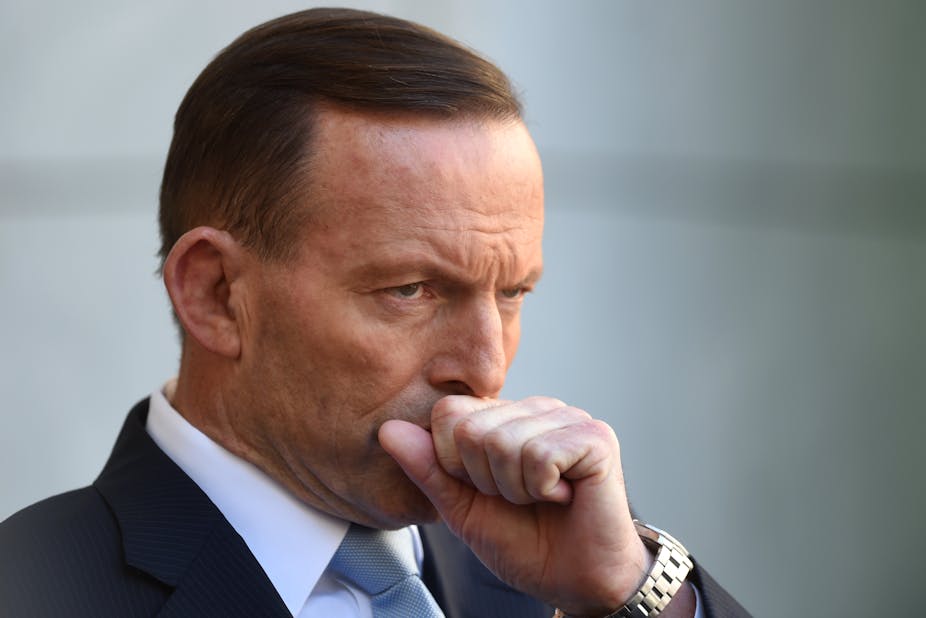Announcing cabinet’s approval for our forces to enter combat against the Islamic State Tony Abbott said that “Australians are reluctant to reach out to conflicts many thousands of miles away”.
That’s not historically correct. We have, in fact, been in many conflicts – in modern times Korea, Vietnam, Afghanistan come quickly to mind. And of course, Iraq.
When Abbott, a member of the Howard government that made the 2003 Iraq commitment, was asked on Friday whether in retrospect he thought that was a wrong decision, he wouldn’t give a definite answer.
“My general principle is to do what’s needed today rather than worry about what happened yesterday.” We did have to learn the lessons of the past, he said, and we couldn’t be more ambitious for the Iraqis than they were for themselves.
Abbott constantly distinguishes the two conflicts: that was an invasion of a country; this is supporting a legitimate government against insurgents.
What is similar, however, is that how the new Iraq story will work out can’t be foreseen, just as the 2003 invasion turned out to be a leap into the dark. That war didn’t bring a permanent solution; there’s no guarantee this time either. We are operating in a part of the world where traditional military power doesn’t have easily predictable results, at least for the long term. That’s not an argument against the action or Australia being part of it, but a reminder against high expectations.
Abbott cannot give an estimated time line – other than warning that the deployment could be “quite lengthy”. He mentions months. We were in Afghanistan for years, through several prime ministers.
Nor can he precisely benchmark success. How “disrupted and degraded” must the Islamic State (ISIL) be? “We will know that we are succeeding when ISIL are in retreat, not in advance. We will know that we are succeeding when the Iraqi Government is restoring a modicum control over its own cities and towns.” But, he admitted, “it is very difficult to eliminate an idea”.
How costly the deployment will be can’t be known this early. In terms of lives: any deployment is dangerous but the nature of this one (aircraft, special forces acting in an advisory role, no conventional boots on the ground) should minimise risks to Australians. The financial cost will depend on how long we’re there and if there is any expansion of role. The government has Labor support, containing any political cost for now.
Common sense and the words of ISIL radicals suggest that involvement does heighten the risk of attacks in Australia. That is just something that has to be accepted if it is considered we should play our part. But Abbott (and indeed ASIO) won’t concede such a danger. On one hand we have a heightened terror alert, more security measures, new harsh anti terror legislation, and the PM points to the risks posed by radicals returning from Syria and Iraq. But on the other hand he insists “we are a terrorist target not because of anything we have done, but because of who we are and the way we live”. He points out that the 2002 Bali bombings came before we went to Iraq. But the attack came after our involvement in Afghanistan began and that was cited as a factor.
As we move into this conflict, managing relations between the wider Australian community and the Muslim community becomes critical. Abbott makes the point that “we are committing to combat operations in support of an Islamic government” and to protect Muslim people against ISIL. “So there is no reason whatsoever why what the Australian government has embarked upon from today should upset the vast majority of Muslims here in Australia.”
But the situation in the Middle East and the connections of some young local radicals to it, with the consequences that brings, makes for a more charged atmosphere here. Concerns of the mainstream Muslim community are heightened; the intolerance displayed by some members of the general community increases. The demands on political leaders, as well as police and community figures, become greater.
This week’s debate about the burqa and Parliament House security showed the need for basic sensitivity.
Abbott was asked on Friday whether he knew before it was announced of the presiding officers’ decision to confine to glass enclosed areas veiled women who observed parliament.
“Look, someone gave me a bit of paper at the close of Question Time. I regret to say I didn’t have a chance to read it and the first I was aware of the decision was some time yesterday evening,” he said.
Was his office aware of that decision before it was announced? “I don’t honestly know. I don’t honestly think it matters.”
It does matter, because the ill-thought out decision caused problems, just as did some of Abbott’s own comments about the burqa. One Abbott staffer said later the Prime Minister’s Office did not know. If it didn’t, it should have.
Abbott has intervened to stop the segregation going ahead. But the damage has been done.
The government has been very careful to get the “process” right for the Iraq commitment. Being ultra careful with the detail (and the symbols) is equally important in the government’s dealings with Australia’s Muslims.

